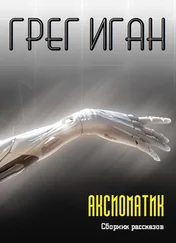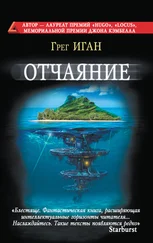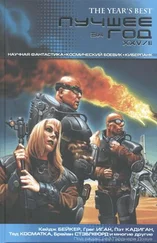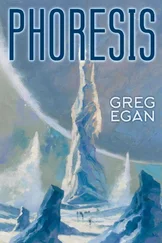Tchicaya said, "Who are the three?"
"Alejandro, Wael, and Mariama," Branco replied. "I don’t know any of them well. But you’re the one who’d be left here with them, so you’d better decide whether that would be to your advantage or not."
The retreating ship was vanishing into the borderlight. Tchicaya didn’t want the power to gamble with anyone’s fate, but the rebels had left the builders with no choice but to juggle odious alternatives, and now Branco had dragged him into the same quagmire.
If the rebels were trying to destroy the Rindler , it was because they believed they had nothing more to do here, which meant that the Right Hand was already primed to scribe Planck worms without further intervention. Sparing everyone in the module wouldn’t put the far side in any greater danger, so he should err on the side of saving those people, in the hope that they’d help him fight the Planck worms. If he was left here alone, drifting off into the distance, he might be able to control the Left Hand remotely for a while, but without the shuttle he’d eventually lose radio contact.
The rebels could still be mistaken, though. The first attempt to create the Planck worms could fail. If anyone aligned with the rebels remained, they could work to rectify those early mistakes; they’d have decades to achieve their goal, virtually guaranteeing that the far side would be obliterated. So maybe it would be safer to be left alone, to do whatever he could in the time he had.
It all came down to whether or not one or more of those three people had been swayed by the rebels, as Birago had been swayed. Birago, who’d always seemed passionate but reasonable, and nowhere near as fanatical as Tarek.
Alejandro, Wael, and Mariama .
Branco said, "We’ve worked out the strategy the rebels are using. It’s not the best, but it is effective. If they’re not stopped, they’ll definitely spill the fuel."
Tchicaya said, "Cut it loose."
He stared at the horizon, watching for some glint from the laser in action, but that was futile. He couldn’t see any part of the ship anymore, and the portion of the tether that was glowing white hot would only be centimeters long.
"Branco?"
"Nearly there. It will take a few more seconds. Rasmah’s just reached the hub. She’s fighting with two of the rebels." Branco chuckled "Make that one."
Tchicaya’s spirits soared. He asked the ship to show him the struggle.
There was no response. He asked again.
On the horizon, a dazzling bead of violet light appeared, outsining the border. Then his suit shut off his vision.
When the first, paralyzing wave of despair had left him, Tchicaya tried to contact Mariama. Without success, but he’d steeled himself for that further small blow. He didn’t know which way the module had been flung, but with every minute that passed both of them were six kilometers further from the point where the Rindler had been, and it was possible that they were already too far apart for direct Mediator-to-Mediator contact. The module would have its own longer-range transceivers, but it was possible that they’d been damaged by the radiation from the Rindler 's fireball.
He had to be patient. If Mariama had survived, she would find a way to contact him.
Belatedly, it occurred to him to try the Left Hand. It responded. The vote Yann had spoken of had gone through in time: the Left Hand not only acknowledged his signal, it was willing to take instructions from him.
He had his Mediator construct a virtual replica of the familiar Blue Room console, and he placed himself before it. He merged Yann’s toolkit with the interface, and summoned the first simple menu of possibilities. For several seconds, he was too afraid to do anything but stare at the screen. Then he scribed a probe that would enter the far side and return as quickly as possible.
Minutes later, the echo came back to him. The surface layer of the far side, at least, was unchanged, populated by exactly the same mix of vendeks as they’d seen with the first experiment.
He tried a deeper probe. The result was the same: nothing had changed.
Tchicaya left the scape. He watched the horizon hopefully, sifting through the possibilities. The rebels had chosen not to scribe the Planck worms before mounting their attack on the ship. Perhaps they’d feared that they’d encounter more determined resistance from their opponents, if the annihilation of the far side was already playing out right before their eyes. A premature assault on the border would also have weakened the position of the remaining Preservationists, if the mutiny had been crushed. In any case, the fact that they’d felt a need to destroy the Rindler implied that the rebels were not confident that the process would be unstoppable once it had begun.
If the rebels hadn’t arranged for the loss of the ship to trigger the event immediately, there had to be some kind of timer counting down. If Mariama had got the shuttle free, she might have headed straight for the Right Hand, to pluck it out of the equation completely. If Birago had successfully corrupted it, the Right Hand would not take orders from her, and it was certainly more able to look after itself than the Scribe had been, dodging far larger shifts in the border. But Tchicaya doubted that it was equipped to defend itself from a determined assailant. The shuttle had more powerful engines; if it came down to brute force, she could probably bulldoze the Right Hand straight into the border.
If she reached it in time.
And if she was willing.
Three and a half hours after the loss of the Rindler , the border was transformed. Tchicaya didn’t perceive anything approaching; he merely saw the expanse of white light replaced in an instant by an opalescent gray. He turned just in time to catch sight of the edge of the change as it vanished behind him.
The sphere of the border was so vast that the true geometrical horizon was a billion kilometers away, but to his unaided vision everything beyond about a million kilometers occupied a single line, too narrow to resolve. After replaying the event, his calculations could not rule out the possibility that the change had swept by at lightspeed. That would have made it literally impossible to see coming, and then the delayed evidence of the fleeing edge would have given the impression that it was traveling at half its true speed, crossing the million kilometers he could distinguish in about six seconds.
He checked with the Left Hand. Being closer to the border, its field of view was smaller than Tchicaya’s, but its instruments left his senses for dead. It had tracked the change he’d witnessed, and judged it to be moving at the speed of light.
Not roughly, not nearly, but, to the limits of measurement, precisely the speed of light. Which meant that the Planck worms could not be pursued, let alone stopped.
The battle was over. The far side was lost.
Tchicaya caught himself angrily. The ability to move across the border at lightspeed didn’t guarantee the power to penetrate the far side at the same rate. For all he knew, he’d just seen nothing more than a variation on Branco’s surface-pinning effect.
He told the Left Hand to scribe another probe.
It couldn’t. The border had retreated.
Retreated how far ? The Left Hand couldn’t tell him. How do you measure the distance to a featureless, immaterial plane of light? Once the border had slipped out of range of the particle beam of the stylus, the Left Hand had lost the ability to summon forth any kind of echo. It had scattered a small cloud of electronic fireflies, moving at about ten meters a second, to see when they were extinguished. So far, they all remained intact. It was no use tracking the brightness of the borderlight; each square meter of the border would seem dimmer as it retreated, but that effect was canceled out precisely by the fact that any particular instrument you aimed at it, with some fixed angle of view, would be taking in light from a larger portion of the border the further away it was. And there was no Doppler shift to reveal the velocity of retreat: the far side was being pared away, not pushed away, and the new, gray borderlight was being emitted from a succession of different surfaces, not a single moving source that could act as a clock.
Читать дальше










![Грег Иган - Рассказы [компиляция]](/books/419837/greg-igan-rasskazy-kompilyaciya-thumb.webp)
